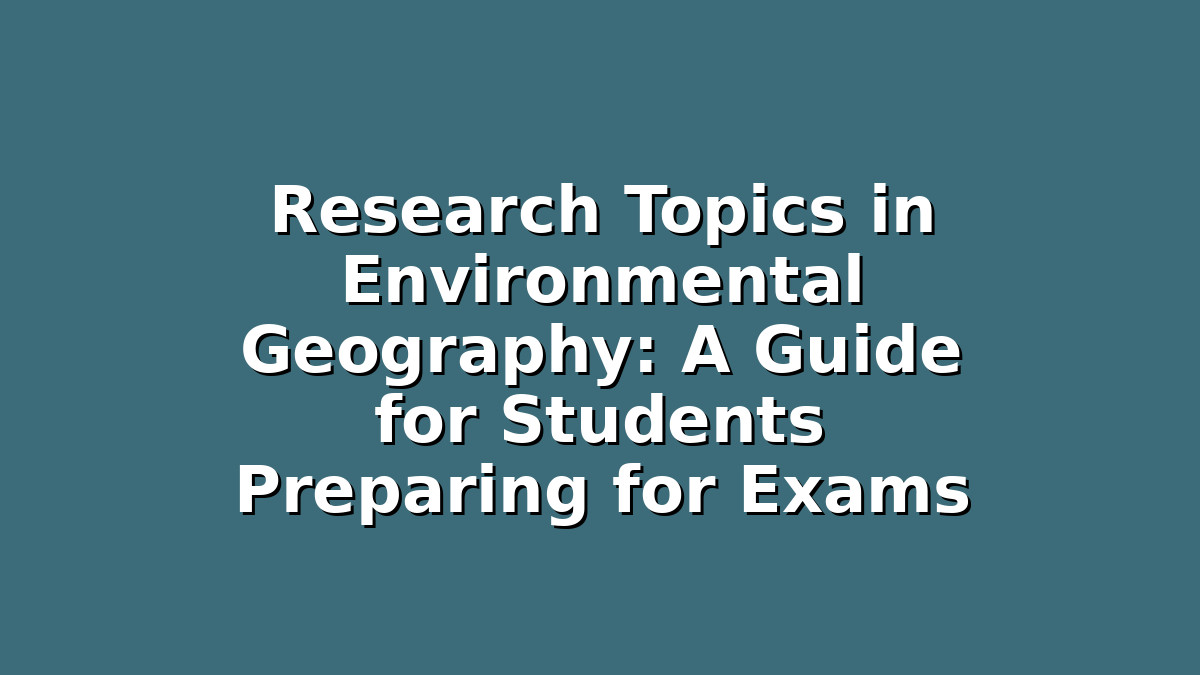Environmental geography is a fascinating field that explores the relationship between humans and their natural surroundings. It combines physical geography, which studies natural processes, with human geography, which looks at how people interact with the environment. For students preparing for exams or seeking to deepen their understanding, focusing on research topics within environmental geography can be both engaging and rewarding. This article will guide you through some compelling research topics and offer study tips to help you succeed.
Understanding Environmental Geography: Why It Matters
Before diving into specific topics, it’s important to understand why environmental geography is so crucial. Our planet faces numerous environmental challenges such as climate change, deforestation, pollution, and resource depletion. Studying these issues through the lens of geography helps us understand spatial patterns, causes, and potential solutions. This interdisciplinary approach equips students with critical thinking skills and a broader perspective, which are invaluable for exams and future academic or career pursuits.
—
1. Climate Change and Its Geographic Impact
One of the most prominent research areas in environmental geography is climate change. This topic covers how global warming affects different regions and ecosystems and how human activities contribute to these changes.
#### Study Tips for Climate Change Topics:
– Focus on case studies: Look at specific regions affected by climate change such as the Arctic, the Amazon rainforest, or coastal cities facing rising sea levels. This helps you understand real-world applications and makes your answers more concrete.
– Use visuals: Maps, graphs, and satellite imagery can clarify complex data and trends. Practice interpreting these visuals as they often appear in exams.
– Link causes and effects: Be sure to connect human behaviors (like fossil fuel consumption) to environmental outcomes (like increased hurricanes). This cause-effect reasoning is essential in exam essays.
Potential research questions:
– How does climate change affect the frequency and severity of natural disasters in different parts of the world?
– What role do urban areas play in contributing to and mitigating climate change?
– How are indigenous communities adapting to changing environmental conditions?
—
2. Deforestation and Land Use Change
Deforestation is another critical environmental geography topic that examines the conversion of forested land to other uses, such as agriculture, urban development, or mining. This process has significant implications for biodiversity, carbon storage, and local climates.
#### Study Tips for Deforestation and Land Use:
– Understand the drivers: Study economic, social, and political factors behind deforestation in various regions, such as the Amazon or Southeast Asia.
– Compare regions: Different areas experience land use change differently. Comparing tropical rainforests to temperate forests can deepen your understanding.
– Practice writing balanced arguments: In exams, you may be asked to discuss the benefits and drawbacks of land use changes. Prepare by outlining pros and cons clearly.
Potential research questions:
– What are the primary causes of deforestation in the Amazon basin?
– How does deforestation impact indigenous populations and biodiversity?
– What policies have been effective in reducing deforestation rates globally?
—
3. Water Resources and Management
Water is a vital natural resource, and its management is a key issue in environmental geography. Topics in this area explore freshwater availability, pollution, and the impact of human consumption on water systems.
#### Study Tips for Water Management Topics:
– Learn key terms: Understand concepts like watersheds, aquifers, water scarcity, and pollution sources.
– Use examples: Relate your answers to specific examples such as the Aral Sea disaster, the Nile River basin, or urban water crises in cities like Cape Town.
– Think spatially: Water issues often involve geography at multiple scales—from local to global. Practice explaining these scales in your answers.
Potential research questions:
– How does urbanization affect freshwater availability and quality?
– What strategies can be used to manage water scarcity in arid regions?
– How do agricultural practices contribute to water pollution?
—
Effective Study Strategies for Environmental Geography
Besides focusing on interesting topics, adopting smart study strategies can boost your exam performance:
– Create mind maps: Organize topics and their connections visually to improve recall.
– Practice past papers: Familiarize yourself with common question formats and improve time management.
– Discuss with peers: Study groups can help clarify difficult concepts and expose you to different viewpoints.
– Stay updated: Environmental geography is dynamic, so reading recent articles and reports can provide fresh examples and insights.
—
Conclusion
Research topics in environmental geography offer a rich landscape for students aiming to excel in their exams. Whether you choose to focus on climate change, deforestation, or water management, the key is to approach your studies with curiosity and organization. By linking theoretical knowledge with real-world examples and practicing effective study techniques, you’ll not only prepare well for your exams but also develop a deeper appreciation for the environment and our role in preserving it.
Good luck with your studies, and remember: every step you take in understanding environmental geography brings you closer to making a positive impact on our planet.

Responses